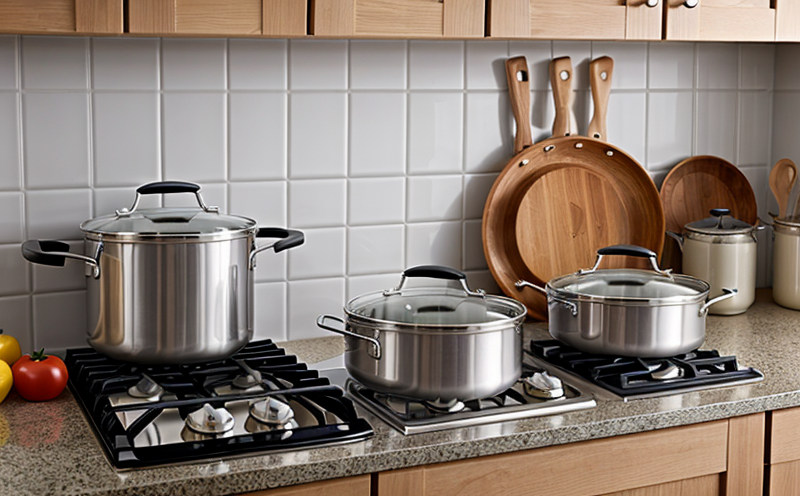Cadmium Content Testing in Enamel Cookware
Ensuring product safety and compliance with international standards is paramount in the consumer products sector. In particular, kitchenware and cookware must meet stringent requirements to protect consumers from harmful substances such as cadmium. Cadmium content testing in enamel cookware focuses on detecting trace amounts of this heavy metal that may leach into food during prolonged contact. This service ensures compliance with global regulations and enhances brand reputation by guaranteeing product safety.
The testing process involves several critical steps, including the selection of appropriate samples for analysis, preparation procedures to avoid contamination, and the use of precise analytical instruments capable of detecting even trace levels of cadmium. Compliance with standards such as ISO 14950:2018 is essential in this context.
Sample preparation plays a crucial role in obtaining accurate results. This involves cleaning samples thoroughly to remove any external contaminants that could interfere with the testing process. The enamel layer of cookware is then carefully inspected for defects before undergoing chemical analysis. Once prepared, samples are subjected to rigorous testing using techniques like atomic absorption spectrophotometry (AAS), which provides precise measurements of cadmium content.
The significance of this service extends beyond mere compliance with regulations; it also contributes significantly to the reputation and market success of brands in the consumer products sector. By ensuring that cadmium levels are within safe limits, manufacturers can avoid legal issues and protect their consumers from potential health risks associated with prolonged exposure to this toxic metal.
Consumer trust is a vital asset for any brand operating in competitive markets. Compliance with stringent testing protocols not only meets regulatory requirements but also instills confidence among customers who value product safety above all else. Moreover, adherence to these standards can open doors to international markets where similar regulations are enforced.
International Acceptance and Recognition
- ISO 14950:2018 - Consumer Products Safety: This standard provides guidelines for ensuring that consumer products do not pose unreasonable risks to health or safety. Compliance with this standard is essential for manufacturers seeking to gain international acceptance.
- ASTM E1687-19 - Standard Practice for Determination of Metallic Elements in Paints and Related Coatings: Although primarily focused on coatings, ASTM standards provide a robust framework that can be adapted for enamel cookware testing. International acceptance often hinges on adherence to such globally recognized practices.
Quality and Reliability Assurance
The quality and reliability of test results are paramount in ensuring the safety and effectiveness of products like enamel cookware. Our laboratory employs state-of-the-art equipment and highly skilled personnel to conduct these tests accurately and reliably. By leveraging advanced analytical techniques, we can provide precise measurements of cadmium content, enabling manufacturers to make informed decisions regarding product design and manufacturing processes.
Reliability assurance is achieved through strict quality control measures that ensure consistent accuracy across all samples tested. This includes regular calibration of instruments, adherence to standardized procedures, and continuous training for laboratory personnel to stay updated on the latest technological advancements. Our commitment to reliability extends beyond individual tests; it encompasses an ongoing effort to improve testing methods and maintain high standards.
The importance of quality assurance cannot be overstated in the context of consumer product safety. Ensuring that each batch of enamel cookware meets strict cadmium content limits helps prevent recalls and protects both consumers and manufacturers from potential legal liabilities. By investing in robust quality management systems, companies can build long-term relationships with satisfied customers while maintaining a positive brand image.
Competitive Advantage and Market Impact
- Enhanced Consumer Trust: By demonstrating adherence to stringent testing protocols, manufacturers can earn the trust of consumers who prioritize product safety. This trust translates into increased market share and customer loyalty.
- Increased Compliance with Global Standards: Ensuring compliance with international regulations opens up new markets where similar standards are enforced. This broadens distribution channels and increases sales opportunities for manufacturers.
In today’s competitive landscape, maintaining a strong reputation for product safety is crucial for success in the consumer products sector. Our cadmium content testing service not only helps companies comply with regulations but also contributes to building a robust brand identity based on trustworthiness and reliability.





